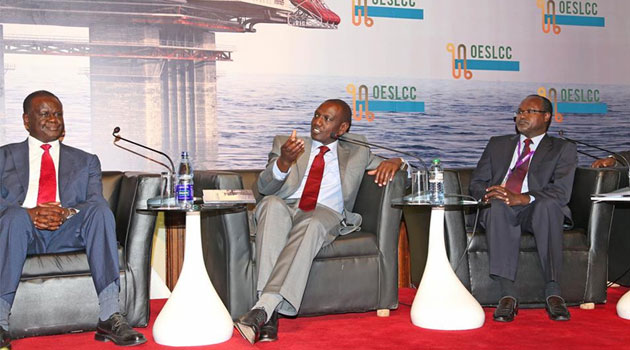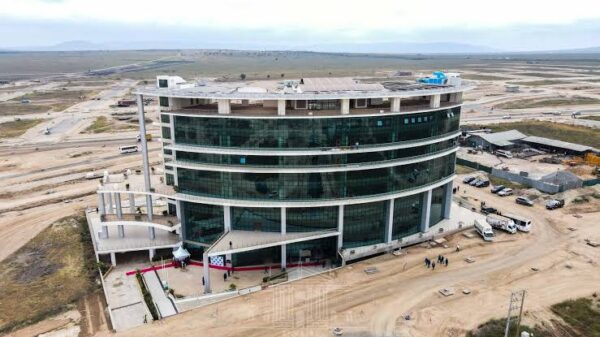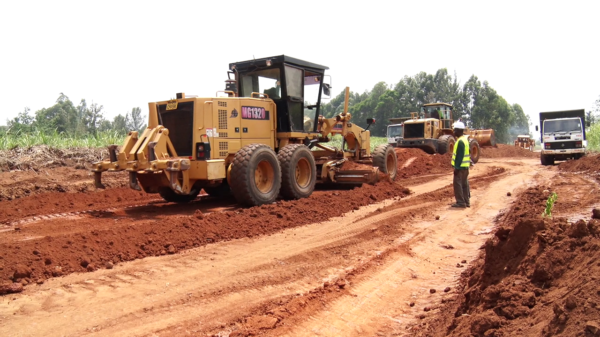
DP Ruto was speaking in Nairobi during the second edition of the annual Oil and Energy Services Local Content Convention. Photo/ PSCU
NAIROBI, Kenya, Jun 17 – Deputy President William Ruto has asked international oil companies (IOCs) to consider raising capital in the local stock market to give Kenyans a real stake in the local oil, gas and mining sectors.
Speaking in Nairobi during the second edition of the annual Oil and Energy Services Local Content Convention, Ruto observed that local participation was not limited to employment and supply of goods and services but also making locals worthy partners in the extractive industry business.
“We must find the equilibrium between profits to investors and benefits to the community,” said the Deputy President.
Ruto said the oil, gas and mining sector has the potential to drive the next phase of Kenya’s economic growth, but this can only happen if locals are not bystanders in the process. He observed that experiences from other resource-rich countries in Africa showed that there were significant revenues to be generated in the exploitation of natural resources.
The DP however regretted that many mineral-rich African countries have had a difficult history characterized by conflict, serious environmental concerns and limited economic benefits accruing to citizens. He called for a holistic policy on local content covering the entire spectrum of the economy so that legislation and regulations can be properly targeted.
“We believe that if we undertake legal and regulatory reform, make necessary investments in infrastructure, technology, and skills development, as well as approach the development of these sectors soberly, there can be significant gains in the economic development of our country Kenya and the East Africa region at large,” said the Deputy President.
He added: “Our region can learn from the experiences others and hence re-write the African story on resource management.”
The East African region has in recent years reported the existence of commercially viable deposits of some of the world’s most precious minerals and mineral oils.
Tanzania boasts of about 55 trillion cubic feet (tcf) of natural gas reserves while Uganda has several billion barrels of oil reserves. Kenya, on the other hand has discovered world class deposits of minerals in the coastal region, where titanium production is ongoing. It has also reported the discovery of commercially viable oil deposits in Northern Kenya.
Ruto said that the Government was developing strategies and regulations to ensure the Kenyan people benefited from the local extractive industry across the entire value chain.
He said the Government is committed to delivering a stable policy, legal and regulatory framework for oil and gas and mining sectors. He also alluded to an extensive capacity building program in place for several government ministries that will allow them to serve all stakeholders and perform their duties better.
“If there is a way that together we can develop a network of competitive and efficient local suppliers who can contribute inputs to the extractives sector and in the process we can create jobs, increase incomes for workers, and improves skills in companies and the workforce, then I would say that we should start work immediately,” stated the DP.
Speaking at the same meeting, Oil and Energy Services (OES) Limited CEO, MwendiaNyaga, called on all stakeholders to manage the high expectations around the discovery of oil and gas. This, he said, could help mitigate conflict and disillusionment.
Mwendia appealed to the government and multinational oil and gas firms to lead the development of a local workforce and building the capacity of local suppliers to enable Kenyans participate fully in the extractive industry.
There are ongoing efforts spearheaded by multinational and local industry players. Some of these include development of basic skills at Lodwar Youth Polytechnic in Turkana County by Africa Oil Kenya BV, training at Postgraduate level in Geology and Geosciences by Total and SME training and support in local vehicle ownership by Tullow. The vehicles are then hired out to Tullow for day to day operations.
National Oil has also partnered with University of Nairobi to build a Geochemical Analysis Laboratory at Chiromo Campus while Africa Oil is involved in imparting skills on oil and gas to employees of relevant government departments through its’ PETRAD scholarship program and parastatals such as NOCK. Africa Oil has also partnered with Lodwar Polytechnic in the development of middle lever skills.
Mwendia observed that more needed to be done noting that services like seismic acquisitions, drilling, research and development, among other core services, could take years of investment and partnership to realize.
“Unless this is done progressively and strategically, we are likely to witness a situation where key jobs and services are outsourced to foreign firms and expatriates,” said Mwendia.
“The opportunity cost, both on the financial and social fronts, is mind boggling,” he added.
Kenya has an estimated 1 billion barrels of crude oil. There could be more billions of barrels waiting to be confirmed. However, it will take years before this wealth can be translated into tangible wealth for local communities and the country.
Others at the meeting were Meru Senator Kiraitu Murungi, who chairs the OES Local Content Steering Committee and Hon Elly Karuhanga, the Chairman of the Chamber of Mines and Petroleum, Uganda.


































